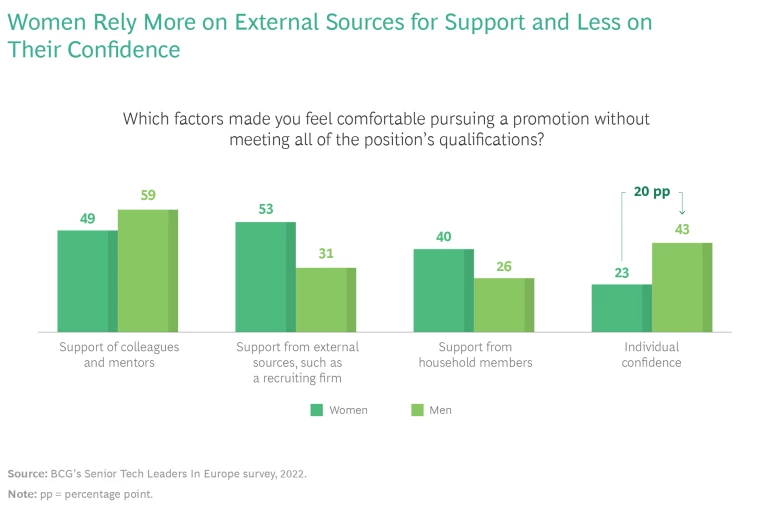Companies facing intense competition for talent can take concrete steps to attract more women to tech and encourage them on their path to leadership.
Getting to the top in technology is tough—and it’s especially tough for women. They often face hurdles to becoming senior leaders. It is critical that tech companies clearly understand what’s necessary to accelerate women’s rise through the ranks—not only because it’s the right thing to do but also because of the economic benefits. The competition to hire talented candidates for tech positions continues to be intense, and tech roles will be even harder to fill if women continue to be underrepresented in the industry and corporate tech functions.
Boston Consulting Group and the Women’s Forum, an international platform that promotes women’s views on economic and social issues, developed a picture of the work environment for women in tech . We surveyed more than 1,500 women and men working in tech leadership across France, Germany, Italy, and the UK, and we conducted 30 in-depth interviews with tech leaders. In the report The Network Effect: How Women Beat the Odds to Get to the Top in Tech, we discuss our findings, what stakeholders can do to attract women to the industry, and how to provide a supportive environment so that they can thrive.
Significant Similarities and Differences
One of the primary goals of the research was to understand how women and men make it to the top in tech—and how their experiences are similar and different. We learned that there are three significant similarities between these women and men:
- They are equally ambitious. In fact, the women were slightly more likely than the men to say that they will seek promotions in the next one to three years.
- Both are comfortable taking risks or are willing to take risks to advance their careers, such as by applying to a position without meeting all criteria.
- They all have a high level of technical or tech-adjacent expertise.
However, on their
path to leadership
, women surmount challenges that most men don’t face:
- Many have caregiving responsibilities that result in longer leaves of absence.
- They have few role models and peers to help support and guide them.
- They perceive a greater pressure to prove their skills—tech skills, in particular; thus, women feel they have to work harder for the same recognition.
The Crucial Role of Networks
A key finding of the survey is that when making careers decisions, women tend to rely more on strong networks of support for advice—such as recruiting firms, peers, mentors, sponsors, line managers, affiliation groups, and household members—while men are more likely to rely on their self-confidence in addition to their networks. (See the exhibit.)
We also found that women in France, Italy, and the UK switch jobs less often than men do, losing out on opportunities to broaden their experience and skills, which then puts them at a disadvantage for future senior roles. This reluctance to switch jobs may be related to their caregiver responsibilities and the need for more extended periods of leave, but the result is less opportunity to gain skills, build networks, and progress rapidly.
Concrete Steps to Unlock Women’s Potential
To increase the number of women in technology in general and in tech leadership specifically, corporate leaders at all levels—as well as managers of human resources and diversity, equity, and inclusion—must take action to attract women to tech early and encourage them on their path to leadership.
Corporate leaders need to actively help women build and nurture a support ecosystem through formal mentorship and sponsorship programs, company-sponsored coaching, and affiliation networks. Leaders also should be—and call attention to—relatable role models. Organizations and leaders need to set the tone on inclusivity by promoting inclusive ways of working and flexibility, making caregiver support a priority —for men and women.
Women need to proactively build networks and invest the time to grow and keep those relationships. They also need to make their ambitions known and discuss their goals explicitly with their managers and mentors. It’s important for women to raise their hands for advancement opportunities, take risks, and go for the stretch role. And if they realize that the only way to get these growth opportunities is to change positions or companies, they should decisively make the move.








